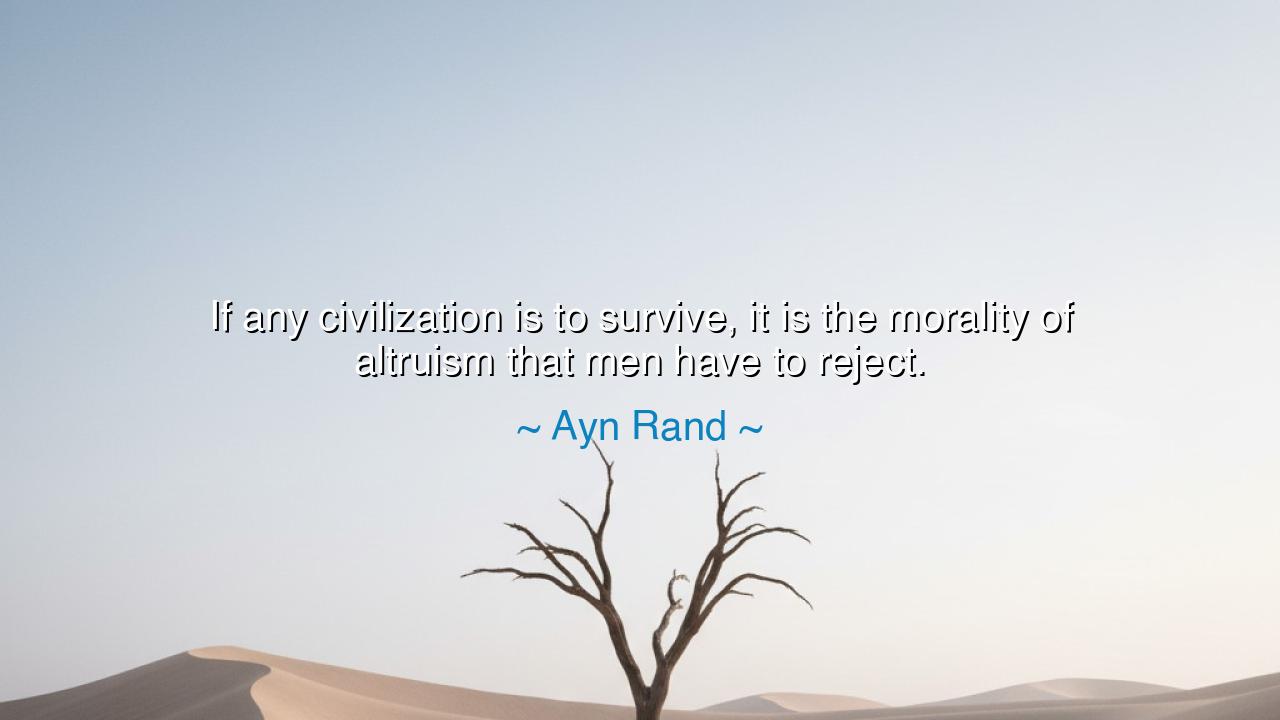
If any civilization is to survive, it is the morality of altruism
If any civilization is to survive, it is the morality of altruism that men have to reject.






"If any civilization is to survive, it is the morality of altruism that men have to reject." These words by Ayn Rand strike with the force of a thunderclap, challenging the very foundation of societal values. Rand, a fierce advocate for individualism and self-interest, claims that the moral code of altruism—which demands self-sacrifice for others—is a weakening force that leads to the downfall of civilizations. In her view, it is not through selflessness, but through a deep commitment to self-interest and personal responsibility, that societies can thrive. This perspective, radical in its time, calls us to question the sacrifice of personal needs for the sake of others, asking whether such sacrifices are truly sustainable in the long term.
In the ancient world, there were those who questioned the ethics of self-sacrifice. The Greeks, with their philosophy of Eudaimonia, or human flourishing, placed great emphasis on achieving a life of virtue that benefited not only the community but the individual as well. Aristotle understood that the good life was one in which a person cultivates personal excellence, finding happiness and meaning in the pursuit of their own potential. The Stoics, led by philosophers like Epictetus and Seneca, also held that virtue was a matter of self-control and rationality, advocating for inner strength and autonomy. Yet, even in these philosophies, there was room for compassion and community, suggesting that while self-interest was paramount, human beings were also bound by a responsibility to others.
Rand, however, took a more direct stance. For her, the morality of altruism was a form of enslavement—a demand that individuals place the needs of others above their own. She argued that this morality encourages a system where self-sacrifice is revered, and the individual is diminished for the sake of the collective. Throughout history, civilizations have often been built on such ideas. For example, the Christian doctrine emphasized the importance of love and sacrifice for others, urging followers to place the needs of their neighbors above their own. While this moral teaching has undoubtedly inspired acts of charity and compassion, Rand saw it as a dangerous force, encouraging people to neglect their own pursuits and ambitions for the sake of an often faceless collective.
Looking through the lens of history, we can see examples of civilizations that were built upon ideals of self-sacrifice and collective good. The Roman Empire, in its imperial splendor, encouraged its citizens to give their all for the glory of the state. Soldiers were taught to lay down their lives for the empire, while the citizens of Rome were expected to sacrifice for the common good of the republic. While the Roman empire flourished for centuries, it ultimately faltered under its own weight. The pursuit of power and glory—coupled with the exploitation of resources and people—led to decay. It was only through the embrace of personal power, the recognition of individual strength, that the Roman world could begin to reawaken in its rebirth, as it transitioned from the collapse of the empire to the Renaissance, a time of great individual creativity and innovation.
The lesson from these examples is powerful: in self-sacrifice, the individual loses their strength, and the collective eventually suffers. A society that demands the subjugation of the individual in the name of the collective can never truly prosper. Rand's philosophy, while controversial, reminds us that the individual—with their own dreams, goals, and desires—must be the center of the moral code. Only when individuals pursue their own happiness through their own effort can a civilization truly thrive. In this, Rand calls us to reject the moral code of selflessness, for it diminishes human potential and stifles the drive that has always propelled humanity forward.
But what does this mean for us today? The modern world is still filled with messages of self-sacrifice for the collective good, but we must ask: is this morality truly the best for us? Are we truly thriving when we give up our individual aspirations for the sake of a greater good that may not always serve us? Thoreau, in his great work Walden, urged individuals to live deliberately and to question the conventional paths laid before them. Like Rand, Thoreau valued the individual above the collective pressure to conform. Today, we must find ways to balance our responsibilities to others with a deep commitment to our own growth, striving not for sacrifice, but for empowerment.
The practical lesson we take from Rand's words is to embrace individualism—to seek fulfillment in our own goals and pursuits. We must recognize that our dreams are just as important as the needs of the collective and that true progress comes from each person seeking to be the best version of themselves. While community and cooperation remain valuable, they must never come at the expense of personal growth and ambition. Rejecting the morality of altruism does not mean abandoning compassion, but rather recognizing that self-respect, individual potential, and personal responsibility are the true foundations upon which civilizations—and individuals—can thrive. So, take up the banner of personal responsibility, chase your dreams, and contribute to the world not through self-sacrifice, but through the pursuit of your own highest ideals.






AAdministratorAdministrator
Welcome, honored guests. Please leave a comment, we will respond soon